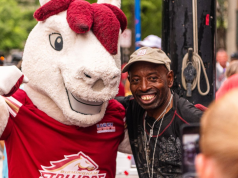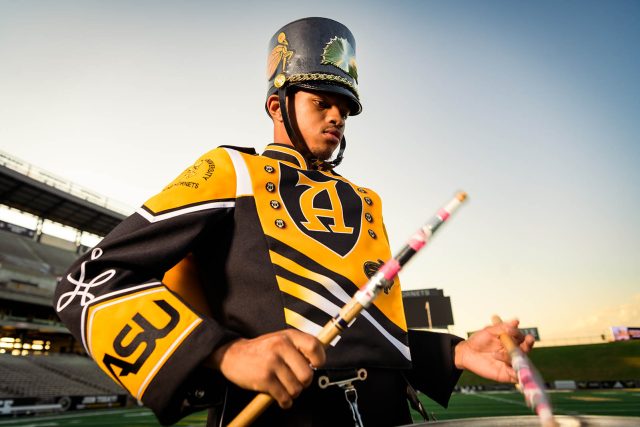
By Solomon Crenshaw Jr. | For The Birmingham Times
As percussion section leader of The Mighty Marching Hornets of Alabama State University (ASU), Cameron Kirkland has a vast number of duties — and one of the most important is harmony.
“My responsibility is to make sure we sound like one,” the 21-year-old senior said. “We have a whole bunch of moving parts with cymbals, snare drums, tenor drums, quads, [a marching drum set of four tenor drums mounted on a single carrier], and bass drums. … My responsibility is to make sure we coexist and intertwine with each other while we play so it doesn’t just sound like a whole bunch of noise.”
The role of the 48-member percussion section is crucial because it sets the rhythm of the 270-member band, the music performance major said. “The drumline, we set the foundation,” Kirkland said.
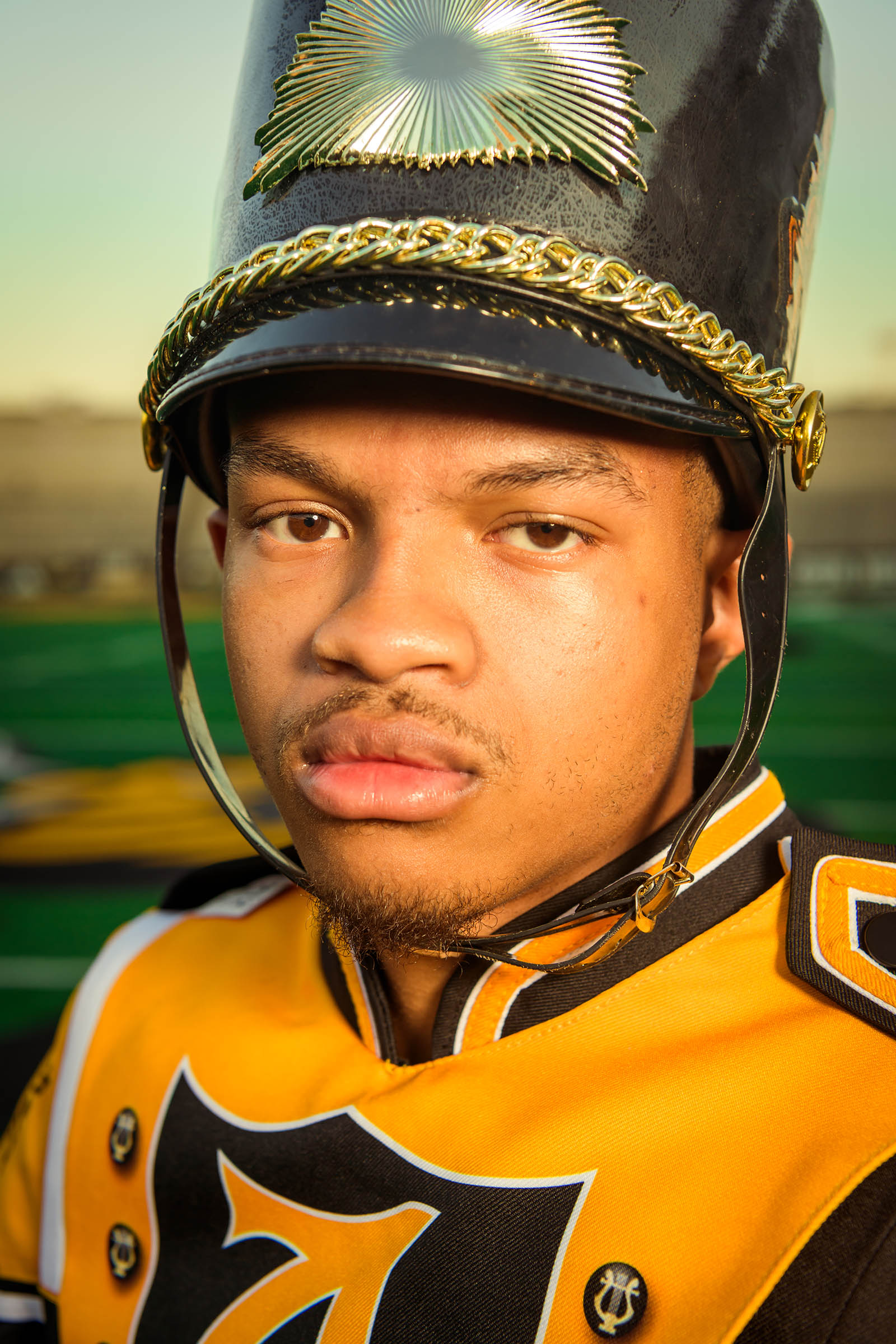
“We are the heartbeat of the band,” he added. “Without us, there’s no sense of time. We definitely are the foundation of how the band is supposed to sound, what they’re supposed to play, how fast or slow they’re supposed to play.”
On the snare drum, Kirkland will help set the rhythm for ASU as the Hornets face the Bulldogs of Alabama Agricultural and Mechanical University (AAMU), on Oct. 26, at the 83rd annual McDonald’s Magic City Classic presented by Coca-Cola.
“As far as preparation, the drumline has to make sure we’re on top of everything with cadence material, how we sound, how we look,” he said. “Obviously, we know [AAMU is] going to come with their A game. We’ve just got to match that energy, be better, and set that standard that we’re still the better percussion section between the two.”
(Cadences are musical arrangements for percussionists that are usually played to maintain the correct rhythm in a marching band.)
The section leader said ASU is coming prepared and the AAMU band can look for some “curveballs,” things the group from Huntsville, Alabama, won’t expect — for example, “some new cadences they’ve never heard before,” said Kirkland.
“At the end of the day, people in the marching band are musicians,” he explained. “You have to play musically with each other and not just be individuals. We’re supposed to play together, not compete. As a drumline, we’re not supposed to compete with the brass or the woodwind or any other instruments in the band. … We’re supposed to play with the band, not against the band.”
“Dramatic Change”
Kirkland says he’s been involved in music practically since birth. “I was raised in the church all my life,” he said. “I started playing drums when I was 3 years old, and I’ve been playing in church ever since then. As far as marching band, I started when I was in the ninth grade.”
But the marching band experience Kirkland had in high school couldn’t be more different from the one at ASU, he said. He is the product of Gahanna Lincoln High School, a predominantly white high school in Columbus, Ohio.
“My high school marching band experience was a more technical, court style. As far as the playing style, the movements were more precise. It wasn’t as aggressive compared to my [historically Black college and university (HBCU)] band career,” he said. “With HBCU marching bands, [the style is] more hard-core, powerful playing. It’s not as technical as a predominantly white marching band. When it comes to the field show, [the field show is] pretty simple, self-explanatory.”
In his high school marching band, there was very little dancing when it came to formations and field shows. Now he’s part of “an entertaining, crowd-pleasing show, marching with The Mighty Marching Hornets,” he said.
It was a “dramatic change” going from his high school band to the ASU band, the percussion section leader said.
“My section leader at the time, [at ASU], was from Ohio, too,” Kirkland said. “He kind of took me under his wing and made sure I was doing everything I needed to do in order to get better every day. I took it upon myself to make sure I was practicing day and night to [develop] the skill set where I’m at now on my instrument.
“I saw videos [of the ASU band performing] prior to making my decision [to attend],” Kirkland said. “It was just their style of play that really caught my eye. I wasn’t fully aware of what I would be putting myself into going from a predominantly white school to an HBCU marching band.”
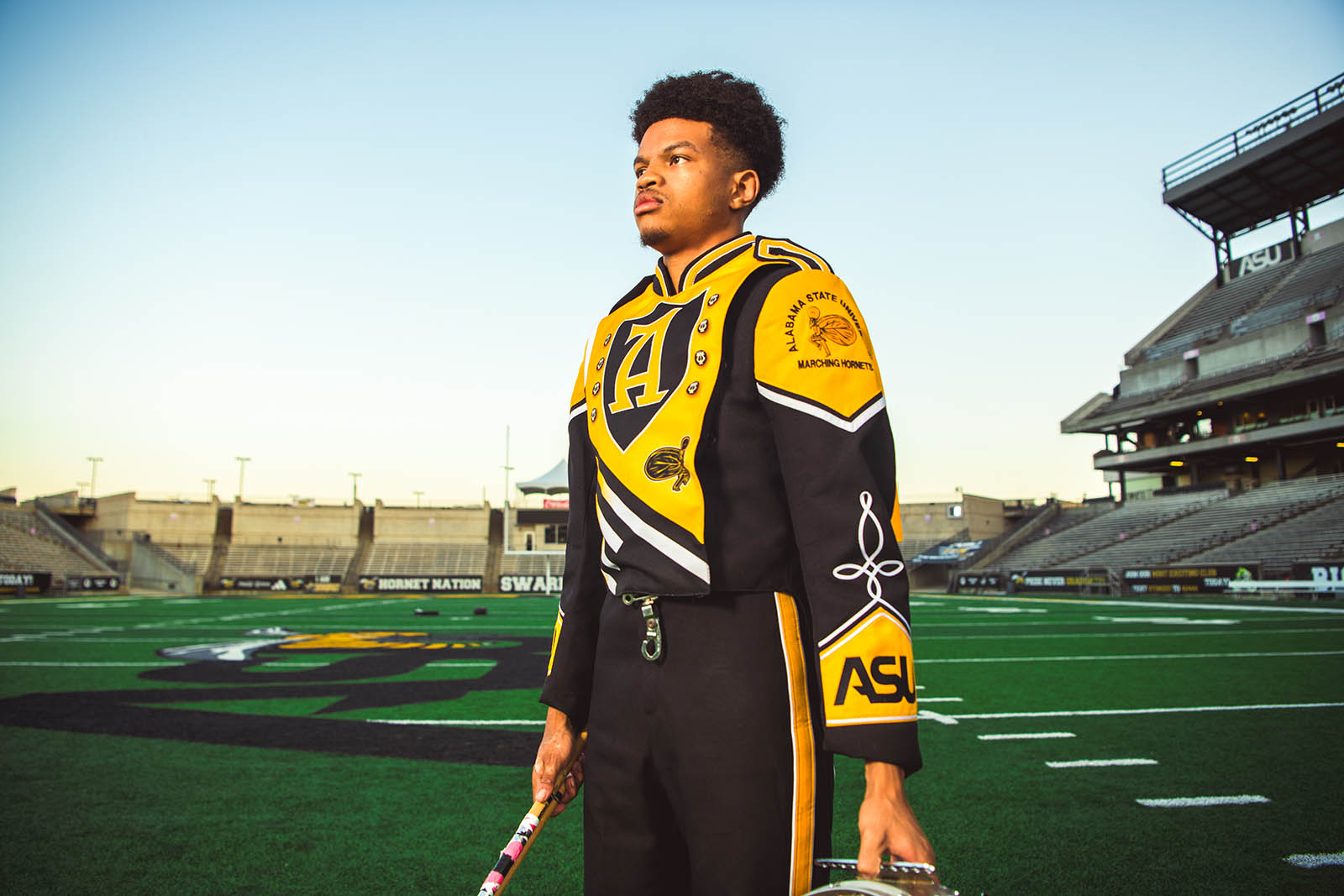
Kirkland said he was humbled by being named section leader.
“In order to be a good leader, you have to follow first,” he said. “I knew how to follow directions first, and I humbled myself. … With my humbleness, I’m able to lead my section. … I’ll be the first to admit if I’m wrong, and I’ll own up to it.”
The section leader is selected by the band director and his assistant band directors, and he or she must show skills in leadership and communication, as well as demonstrate proficiency in playing all instruments of that section. In this case, every percussion instrument.
Kirkland found out he was selected this summer when he saw his name posted on the band’s app, where all members are able to communicate.
“I was excited and ready for the responsibility,” he said. “I said, ‘OK, I have the position as section leader It’s time to handle business. It’s time to get to work.’”
Family Ties
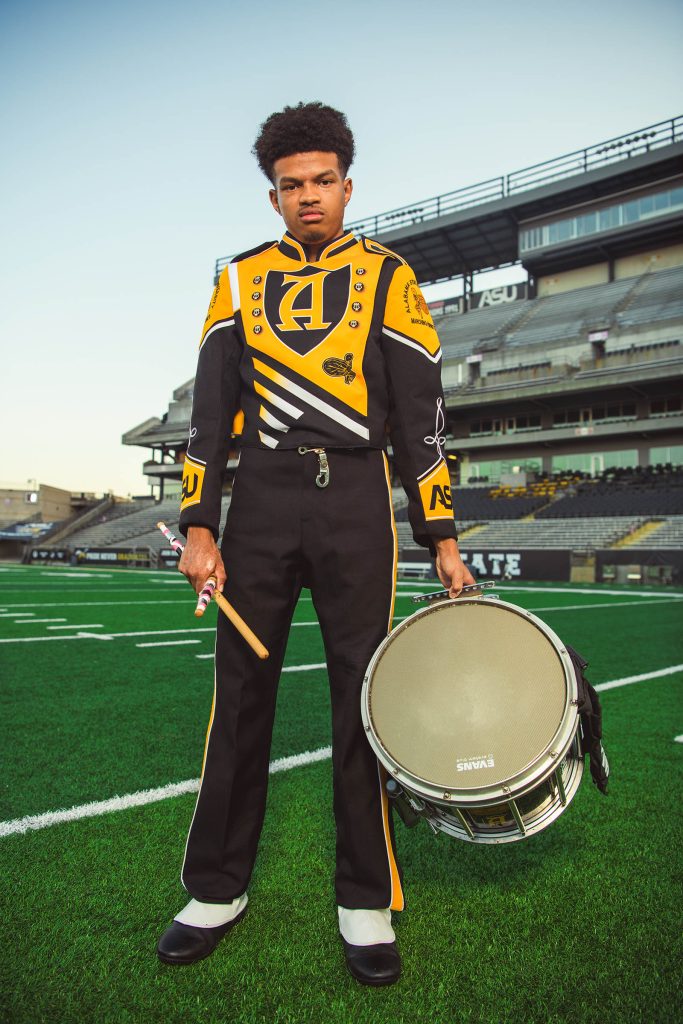
Kirkland played drums at his Ohio church, New Birth Christian Ministries, and continues to play in church today at Montgomery’s Kingdom Seekers Worship Center. Music came naturally, as his father, Cameron Kirkland Sr., played keyboard and organ after first playing drums in church at a young age.
“I have similar stories as far as that,” the oldest of four siblings said. “My mom, [Ahleeya Nelson Kirkland], sings in church, and she grew up in church, as well.”
His sister, Chyara Kirkland, is a freshman at ASU. She’s part of the Hornets’ street dance team, a pep group that does cheers and chants. “They’re like the student performers in the stands, trying to get the crowd involved,” he said.
Beyond his time at ASU, Kirkland hopes to become a touring professional drummer and a sound engineer. As his time winds down with The Mighty Marching Hornets, Kirkland said he will always be grateful for his growth at the university.
“I had people along the way that really helped me, like the staff, my past section leaders, and people in the percussion section itself,” he said. “They helped mold me into the person I am right now, and I’m appreciative that the staff trusted me with the responsibility to have the title as section leader. It’s mind-boggling to think of how far I’ve come to be in the position I’m in now. It is very humbling, and I’m very blessed.”
The 83rd annual McDonald’s Magic City Classic presented by Coca-Cola will be played between the Bulldogs of Alabama Agricultural and Mechanical University and the Hornets of Alabama State University at 2:30 p.m. on Oct. 26, 2024, at Birmingham’s legendary Legion Field. Details about road closings, accessible parking, shuttle services, and much more are available at magiccityclassic.com.




